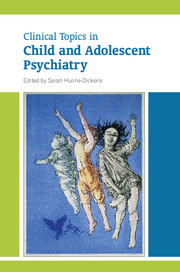Book contents
- Frontmatter
- Contents
- List of tables
- List of boxes
- List of figures
- List of contributors
- Preface
- 1 Child psychiatry and the people who have shaped it
- 2 Fabrication and induction of illness in children
- 3 Personality disorders as disorganisation of attachment and affect regulation
- 4 Post-traumatic stress disorder and attachment: possible links with borderline personality disorder
- 5 Management of antisocial behaviour in childhood
- 6 Pharmacology for attention-deficit hyperactivity disorder, Tourette syndrome and autism spectrum disorder
- 7 Pharmacology for anxiety and obsessive–compulsive disorders, affective disorders and schizophrenia
- 8 Pharmacological management of core and comorbid symptoms in autism spectrum disorder
- 9 Pharmacological treatment of depression and bipolar disorder
- 10 Cognitive–behavioural therapy with children, young people and families: from individual to systemic therapy
- 11 Anxiety disorders
- 12 Somatising: clinical presentations and aetiological factors
- 13 Somatising: management and outcomes
- 14 Evaluating psychological treatments for children with autism
- 15 Attention-deficit hyperactivity disorder: assessment and treatment
- 16 Schizophrenia
- 17 Tourette syndrome
- 18 Sleep disorders
- 19 Self-harm in adolescents
- 20 Adolescent substance misuse: an update on behaviours and treatments
- 21 Eating disorders
- 22 Gender dysphoria in young people
- 23 The psychiatry of children aged 0–4
- Index
17 - Tourette syndrome
Published online by Cambridge University Press: 02 January 2018
- Frontmatter
- Contents
- List of tables
- List of boxes
- List of figures
- List of contributors
- Preface
- 1 Child psychiatry and the people who have shaped it
- 2 Fabrication and induction of illness in children
- 3 Personality disorders as disorganisation of attachment and affect regulation
- 4 Post-traumatic stress disorder and attachment: possible links with borderline personality disorder
- 5 Management of antisocial behaviour in childhood
- 6 Pharmacology for attention-deficit hyperactivity disorder, Tourette syndrome and autism spectrum disorder
- 7 Pharmacology for anxiety and obsessive–compulsive disorders, affective disorders and schizophrenia
- 8 Pharmacological management of core and comorbid symptoms in autism spectrum disorder
- 9 Pharmacological treatment of depression and bipolar disorder
- 10 Cognitive–behavioural therapy with children, young people and families: from individual to systemic therapy
- 11 Anxiety disorders
- 12 Somatising: clinical presentations and aetiological factors
- 13 Somatising: management and outcomes
- 14 Evaluating psychological treatments for children with autism
- 15 Attention-deficit hyperactivity disorder: assessment and treatment
- 16 Schizophrenia
- 17 Tourette syndrome
- 18 Sleep disorders
- 19 Self-harm in adolescents
- 20 Adolescent substance misuse: an update on behaviours and treatments
- 21 Eating disorders
- 22 Gender dysphoria in young people
- 23 The psychiatry of children aged 0–4
- Index
Summary
Tourette syndrome is named after the French physician Georges Gilles de la Tourette. A complex neuropsychiatric disorder with onset in childhood, it is characterised by multiple motor tics and one or more vocal/phonic tics, lasting longer than a year (World Health Organization, 1992; American Psychiatric Association, 2013).
The impact of this disorder is significant and a plethora of studies by several groups have examined the quality of life (QoL) of young people who are affected by Tourette syndrome (Table 17.1). Despite different schedules, the results have been remarkably consistent, and also concordant with adult data, showing that people with Tourette syndrome have a reduced QoL compared with healthy individuals. Employment status, tic severity, as well as greater emotional and behavioural difficulties, obsessive– compulsive behaviours, obsessive–compulsive disorder (OCD), attentiondeficit hyperactivity disorder (ADHD), anxiety and depression all adversely affect the QoL (Robertson, 2012); in addition, functional impairment is increased. Only two out of the eleven QoL studies (Bernard et al, 2009; Eddy et al, 2011a) did not find that tic severity affected QoL.
A Tourette-specific quality of life scale has now been validated (the Gilles de la Tourette Syndrome–Quality of Life scale (GTS-QOL; Cavanna et al, 2008) and a version for children and adolescents has been published in Italian (C…A-GTS-QOL; Cavanna et al, 2013a). Cavanna et al (1212) examined 46 young people with Tourette syndrome aged 6–16 years and reassessed them again 13 years later using the GTS-QOL. Tic severity, premonitory sensations and family history of Tourette syndrome were identified as childhood predictors of a poorer QoL in adulthood, and tic severity adversely affected the physical, psychological and cognitive domains of QoL. Cavanna et al (2013b) compared child- and parent-reported QoL and everyday functioning in a group of 75 youngsters with Tourette syndrome. Although, somewhat surprisingly, no differences were found between young people who had Tourette syndrome only and young people who had Tourette syndrome and comorbid psychiatric disorders, there were differences in scores for total, school and home activities impairment. Furthermore, the parents and youngsters did not necessarily share similar views about the impact of Tourette syndrome on functioning.
Several studies have demonstrated that the parents of youngsters with Tourette syndrome have more difficulties than other parents.
- Type
- Chapter
- Information
- Clinical Topics in Child and Adolescent Psychiatry , pp. 262 - 286Publisher: Royal College of PsychiatristsPrint publication year: 2014



